Search the Special Collections and Archives Portal
Search Results
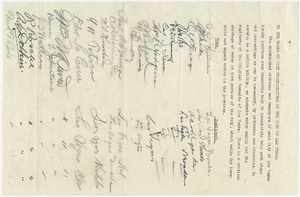
Petition by citizens of Las Vegas to Board of City Commissioners (Las Vegas) requesting adequate water supply, filed July 7, 1927
Date
Archival Collection
Description
Petition signed by citizens and taxpayers of the city of Las Vegas requesting the Board of City Commissioners of Las Vegas to take action to secure an adequate water supply for the residents of the Original Townsite of Las Vegas. Document lists 29 signatures and is stamped with a filing date of July 7, 1927.
Text

Letter from Bertha Witmer (Las Vegas) to Mayor J. L. Russell and the City Council (Las Vegas), July 24, 1939
Date
Archival Collection
Description
Letter from a citizen to the Las Vegas City Commission protesting Ordinance No. 247. Left to Right: Asst. Commissioner of Reclamation N. B. Bennett, Jr., Master of Ceremonies; U.S. Senator Alan Bible; Regional Director A.B. West of the Bureau of Reclamation's Region 3. Handwritten text, transcribed by cataloger. Also, J. L. Russell was Mayor of Las Vegas at that time.
Text
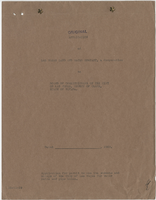
Application for permit to use Las Vegas streets and alleys for water mains and pipe lines, November 1929
Date
Archival Collection
Description
Original application by the Las Vegas Land and Water Company submitted to the Board of Commissioners of the City of Las Vegas for permit to use the city streets and alleys for water mains and pipe lines. Date on cover is November 11, 1929. Signed and dated by F. H. Knickerbocker, vice president of the Las Vegas Land and Water Company on November 23, 1929.
Text
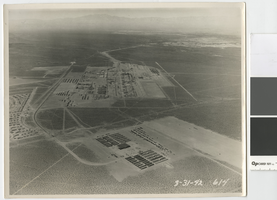
Aerial photograph of the Basic Magnesium Inc. plant, Henderson, Nevada, March 31, 1942
Date
Archival Collection
Description
Aerial view of the Basic Magnesium plant looking west over the Las Vegas Valley towards the Spring Mountains.
Image

Telegram from A. E. Stoddard (Omaha) to E. E. Bennett (Los Angeles), March 17, 1953
Date
Archival Collection
Description
Discussion of how Las Vegas Land and Water Company ownership of all water production would affect their tax situation and the pros and cons of the railroad being named a public utility.
Text

Letter from William Reinhardt (Los Angeles) to A. E. Stoddard, January 30, 1953
Date
Archival Collection
Description
If the bond issue failed, the public might try and force the railroad to increase water production, so the company should consider transferring all water production to the Las Vegas Land and Water Company who was in a better position to resist "unreasonable demands." "Copy" and "80-12" written in red pencil. Letter has several date stamps: E.E.B., E.C.R. and U.P. R.R. Co., Los Angeles.
Text

Letter from William Reinhardt (Los Angeles) to A. E. Stoddard, September 30, 1952
Date
Archival Collection
Description
Discussion of strategy to resist the railroad being forced to spend money to increase water production; Letter has date stamps from E.E.B., E.C.R. and U.P. R.R. Law Department, Los Angeles. "80-12" is written in red pencil in top right corner.
Text
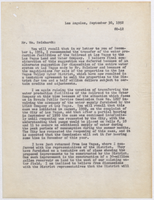
Letter from E. E. Bennett (Los Angeles) to William Reinhardt, September 30, 1952
Date
Archival Collection
Description
The ability of the railroad to resist demands to increase water production would be aided if water production facilities were solely in the possession of the Las Vegas Land and Water Company
Text
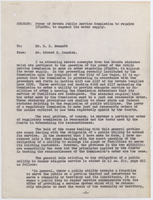
Memo from Edward C. Renwick to E. E. Bennett about the Las Vegas Land and Water Company being required to augment its water supply, 1952
Date
Archival Collection
Description
Discussion of the relevant legal issues and court decisions relating to the question of whether the railroad could be forced to increase water production
Text
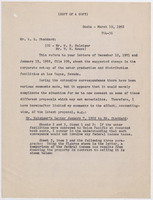
Letter from R. M. Sutton (Omaha) to A. E. Stoddard, March 19, 1952
Date
Archival Collection
Description
Comparison of the economic benefit of selling water production and distribution facilities in Las Vegas to the Water District versus donating them.
Text
